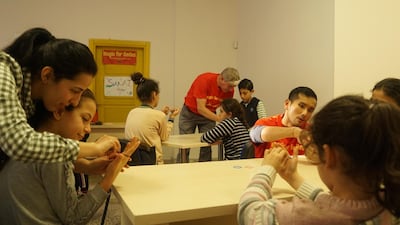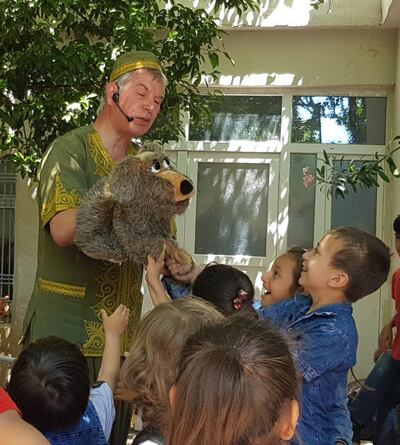A British magician who brings much-needed delight and wonder to some of the world’s most vulnerable children has adapted to the challenges of the coronavirus pandemic by taking his humanitarian work online.
Jamie Balfour-Paul, perhaps best known by his stage name Jamie Jibberish, teaches and performs magic to refugee children living in camps in the Middle East who have fled conflict zones in the region.
The onset of the pandemic, which poses a heightened threat to those in overcrowded camps, means that Mr Balfour-Paul, 59, is no longer able to take his unique brand of bilingual magic to children living in Jordan, Turkey and Lebanon.
But, to mark World Refugee Day last week, the magician took to Zoom to perform online for the first time to an audience of around 40 youngsters in Turkey.
The reactions of the children, who sat huddled in groups around phones, tablets or laptops to watch the performance, were "very positive", Mr Balfour-Paul told The National, also via Zoom, from his home in Oxford.
“It’s lovely to see the results. It’s quite a challenge online because obviously it’s not as interactive as the live show,” he said, adding that there was still a palpable “sense of wonder” in spite of the technological constraints.

Jamie Jibberish had been due to appear in Turkey, Jordan and Gaza before the outbreak struck and lockdown measures, both in Britain and in the camps themselves, made travel impossible. Those dates have now been replaced with virtual magic lessons and online performances.
Before the pandemic, Mr Balfour-Paul travelled to the Middle East to perform as often as possible. He would try to visit refugee camps every other month on behalf of his charity, Magic for Smiles, returning to Britain only to seek more funding for the project. He is currently running a crowdfunding campaign to support his charity.
“I’ve done hundreds of shows now,” he said, adding that his routines were always a success in the camps: “There’s never been a show where the kids aren’t really happy and excited.”
For Mr Balfour-Paul, who has been a magician since childhood, there is something about performing and teaching magic that is particularly well-suited to helping child refugees, many of whom have experienced significant trauma and who must also now contend with isolation.
But the benefits of bringing laughter to refugee children has, he said, been largely overlooked by the humanitarian sector. Promoting the teaching of magic in the camps has been a challenge all of its own, he explained, because aid groups tend to fall back on established ways of dealing with children who are traumatised.
“Magic has huge potential but it’s almost untapped in the humanitarian world,” he said.
Mr Balfour-Paul believes his charity offers its young audiences much more than mere entertainment. “There are emotional benefits like happiness and joy, hope and wonder, and there are cognitive benefits around concentration, analytical skills – like how you do the trick – and imagination,” he said.
Another benefit of magic, Mr Balfour-Paul said, is in teaching the children how to perform the magic tricks themselves. He described a need to give the children something they could keep sharing among themselves long after the show had ended.
“Performance is very important, as well as the technical skills, because it’s there that they really work on their self-confidence,” he said. “It’s lovely to see the results!
“If you don’t see the kids again, then they’ve had a good day and they’ll talk about it for months.”
As well as teaching the children how to perform their own tricks, Mr Balfour-Paul is working with a partner organisation to roll out magic lessons for refugee children when schools reopen.
The pandemic has hit the charity sector hard, but Mr Balfour-Paul said his main concern was for those living in the camps, who are at significantly increased risk from the virus.
The UK government has offered financial lifelines for charities struggling with the virus, but Mr Balfour Paul fears that his charity, which depends heavily on grants and volunteer support could fall through the cracks. “A lot of charities are having to furlough staff or let go of staff… I understand some have lost their endowments,” he said. "Many UK and international charities have very uncertain futures."
The plight of refugees living in overcrowded, often unsanitary camps, remains the top priority for the humanitarian community, though, he said.
“I think the biggest concern of many people is that, once the virus gets into refugee camps, it’s just a hotbed – social distancing is almost impossible. A lot of the camps don’t have basic things like soap.
“At the same time, the agencies that should be helping them are having to cut back and social-distance themselves as well,” he added.
Mr Balfour-Paul’s drive to bring magic into the humanitarian sector is the product of 30 years of experience working in countries and conflict zones across the Middle East and the Horn of Africa.
Born in Beirut, Lebanon, Mr Balfour-Paul is the son of a career diplomat who brought his family with him on postings around the region, helping to foster a deep connection with its people.
But it was only later, while volunteering as an aid worker in a Palestinian village in the 1980s, that Mr Balfour-Paul learned Arabic.
Arabic, along with English and what Mr Balfour-Paul calls “magic language”, are behind the performer’s stage name and have enabled him to speak directly to the children.
Mr Balfour-Paul plans to continue performing remotely for refugee children living in the region and wants to make virtual teaching a permanent part of his charity’s work. He has several more shows lined up in Turkey and Jordan next week, and is making his online tutorials available to camps for free this month.
Despite the progress that his charity has made by moving online, Mr Balfour-Paul is keen to bring his magic back to the children in person as soon as possible.
“The ideal for me is to have a longer-term engagement with the kids,” he said, “but even from a one-off exposure, you can see the benefits.”


















